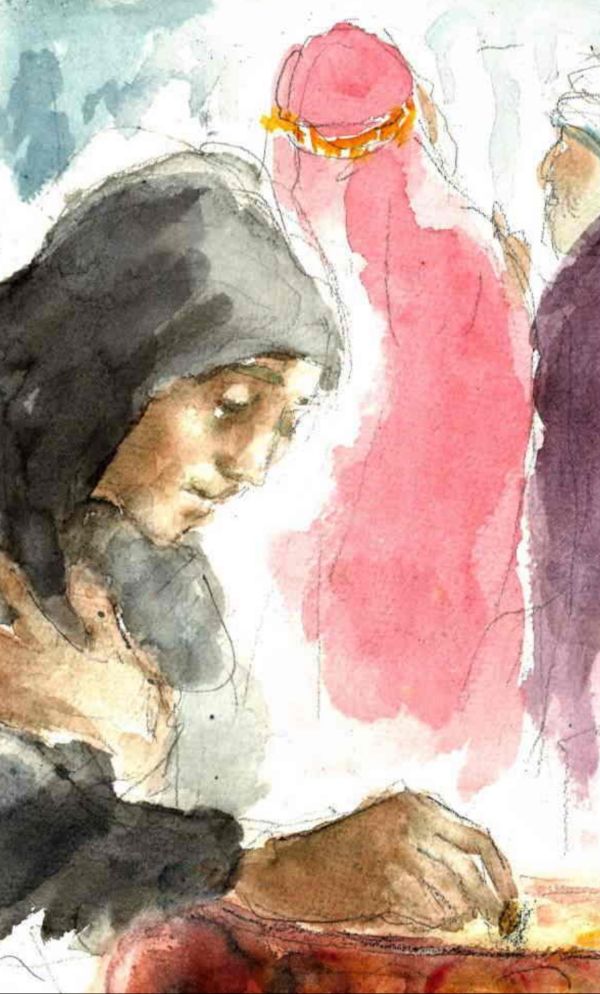Small coins and festival of the voracious God, in solemn appearances
(Mk 12:38-44)
Jesus faces the treasure of the Temple, the true ‘god’ of the whole sanctuary. The comparison is ruthless: one as opposed to the other (v.41).
Enigma that could not be solved with a simple ‘purification’ of the sacred place, or a replenishment of devotion.
It will be surprising, but the Gospel passage does not sing praises of individual humility which by faith deprives itself of everything: it’s rather a radical appeal to church leaders and to the sense of institution.
The Lord is saddened by every expropriation conditioned by awe. Indeed, fear takes life from those who do not enjoy fullness.
Christ weeps the subordinate condition of the poor and neglected: He does not make her take the chair. He does not credit the situation. He doesn’t want the woman already naked by two cents to undress all.
He seems distraught for that one silent figure; to underline the difference between the voracious demands of the ancient religions’ God and those of a completely different sign - in our favor - of the Father in the Faith.
While Jesus noticed and was mourning on the minuteous gesture of the little woman, the Apostles did not even notice the irrelevant poor creature, continuing to gape at the magnificence of the Temple.
Who knows what they were dreaming about... seduced by honor.
To divert them from the fever of reputation and considerations they desired to boast of, there was a need for an awareness; but to move them out of their place and yardstick the miracles would not have been enough.
Thus Jesus seeks to convey in conscience the Good News that the Father is the exact opposite of how he had been painted to them by the spiritual guides of the time.
The Eternal disconcerts: He does not take, does not appropriate, does not plunder, nor does absorb or debilitate us - but He is the One who gives.
He does not punish if you do not placate Him with both the little coins you have, without withholding a single one - even if only by doing in half (v.2).
The honour to God is not exclusive, but inclusive.
Paraphrasing the encyclical Fratelli Tutti, we could say that in authentic communities [as in families] «everyone contributes to the common purpose; everyone works for the common good, not denying each person’s individuality but encouraging and supporting it» (n.230).
The Son notes with bitterness that the beautiful protagonists themselves «devour the houses of widows» (v.40) as vampires. So convincing as to make the souls of the simple even their supporters and victims.
Christ is saddened by such unconscious complicity, induced by the lack of knowledge of the Father’s Face - preached as a leech God.
In fact, in the path of personal Faith true believers are not repeaters of external roles (vv.38-40).
We collaborate with the creative and deifying work of the Eternal in offering ourselves as a vital food for the humanity to which the Bridegroom has been taken away - here in the figure of the poor «widow» who bleed out.
In short, we must no longer macerate and wear ourselves out, because of the glory of the Almighty, but enrich ourselves with Him and pronounce fully!
A God all substance, of little epidermal appearance.
Yet the antithesis of the rich and poor was resurfacing in the early communities... to the detriment of the isolated.
Here, precisely the reversal of the fortunes had to become characteristic of the adoring Church, which is immersed in the same rhythm of the supreme vital Source.
It will therefore be the amiable institution that will remain naked and pilgrim, even in the space of the small and unsteady.
And the action of the assemblies of believers will be able to activate a new, convivial world, humanizing disharmonies.
A reality that beats ‘time’. For a ‘Kingdom’ really not neutral. But where does the soul counts, not the curriculum.
[32nd Sunday (B), November 10, 2024]












